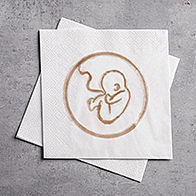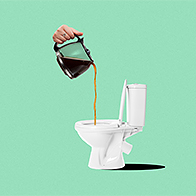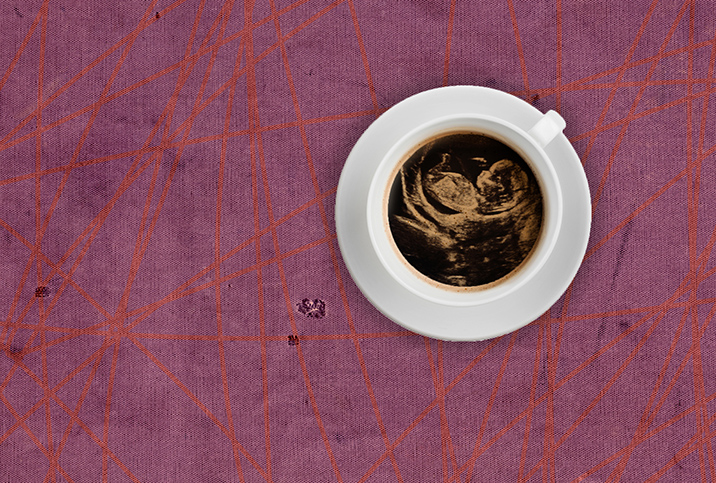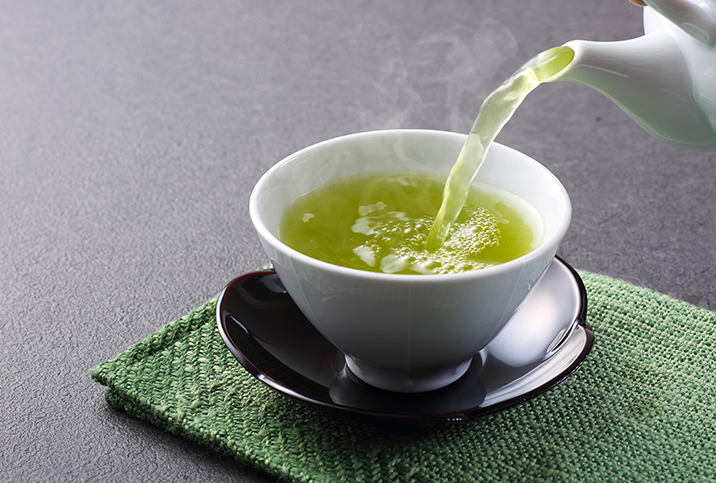What Really Happens to Women's Bodies When We Drink Too Much Coffee?

Drinking coffee may help reduce the risk of certain cancers, but how many cups of coffee are too many cups of coffee? We know we probably shouldn't have a third or fourth cup, but desperate times sometimes call for desperate measures or, at least, lots of caffeine.
But what do experts have to say about how caffeine consumption can impact our hormones, cycles, ability to conceive and our bodies as a whole?
How much caffeine is too much caffeine for women?
Healthy adults should not have more than 400 milligrams of caffeine, the Food and Drug Administration (FDA) reported. An 8-ounce cup of coffee contains roughly 100 mg of caffeine, so about four cups of coffee a day is the FDA's max.
However, everyone's tolerance for caffeine is different. The general consensus is women should limit their caffeine intake to 200 mg, or roughly two cups.
Women who are long-distance runners or cyclists tend to be able to take in more caffeine because it can help enhance their performance and recovery, according to Lyn-Genet Recitas, N.M.T., a holistic health professional and sports nutritionist in New York City.
How do you know how much caffeine is too much caffeine?
Since everybody reacts to caffeine differently, the best way to tell if you're consuming too much coffee is to listen to your body. How do you physically feel after a couple of caffeinated beverages?
"Everyone is different. However, tolerance can be measured by your physical reaction to caffeine. If it decreases your ability to focus, causes jitteriness, loose bowels and feelings of dehydration, then the body is letting us know that it's come to its limit," said Yelena Wheeler, M.P.H., a registered dietitian nutritionist in Los Angeles.
'Do you feel wired, anxious or even more tired after drinking coffee?'
There's one instance where listening to your body is essential.
"If you cannot function without caffeine in the morning, that is a sign that you likely need to wean off of it slowly and completely eliminate it for several months to help your body heal from the dependence," said Abby Grimm, M.S., L.D., a registered dietitian nutritionist with FWDfuel in Bay Village, Ohio.
If you experience intense withdrawal symptoms, it's time to cut back.
How do you know when it's time to cut back on caffeine?
You might need to cut back on your caffeine consumption based on your lifestyle and stress level, especially if you are dealing with adrenal issues from chronic stress, Grimm said.
"If you notice that you have increased anxiety, disrupted sleep, acid reflux, blood sugar drops and mood swings, try giving it up for four days and see if it's the culprit," Recitas suggested.
"One of the ways we can measure how much caffeine is appropriate is by paying attention to the signs and symptoms after drinking coffee. Do you feel wired, anxious or even more tired after drinking coffee? This can mean too much," Grimm said. "If you have a hard time falling asleep or [are] waking in the middle of the night, it's likely too much. You likely need less if you have an irregular or absent menstrual cycle. These are just a few examples."
Other times you should limit caffeine, according to Grimm? During times when stress—physical, mental, emotional—is higher than normal and if you're doing a lot of high-intensity interval training (HIIT) workouts. Limit the amount of caffeine you drink on HIIT days.
What is the effect of caffeine on women's bodies?
Caffeine causes the stress hormone cortisol to rise, which creates or worsens estrogen dominance. Women entering perimenopause are likely already estrogen dominant, so they would want to decrease their caffeine intake, according to Recitas.
"[Caffeine] also increases inflammation, which, as we know, is the main cause for disease, weight gain and premature aging," she added.
Our ability to handle stress (adrenal function) can be impacted by too much caffeine, as can the regulation of our metabolism (thyroid function) and having a healthy menstrual cycle (reproductive function), Grimm said.
Too much caffeine per day can lead to increased health risks. Is it worth those extra cups of brewed coffee?
How does caffeine affect the menstrual cycle?
Since caffeine can lead to estrogen dominance, caffeine can cause a heavier menstrual flow and longer cycles.
"Estrogen dominance can also attack thyroid function, which can increase depression and weight gain—as if PMS was not bad enough," Recitas said.
However, caffeine intake is not connected to PMS, a 2016 study suggested.
Since caffeine increases the body's main stress hormone, cortisol, you might want to cut back on it during your luteal phase, the two weeks leading up to your period, when your body tends to be dealing with more stress and inflammation. Cutting back might help limit cramps, mood swings and/or fatigue, Grimm added.
How does caffeine affect your hormones?
"Women with hormonal imbalance may limit caffeine because taking out the things that contribute to more stress can improve our body's blood sugar balance and overall management of sex hormone production," Grimm said.
In addition to caffeine affecting your thyroid and estrogen dominance, it can raise your sex hormone-binding globulin (SHBG), which can limit your body's ability to use testosterone, which is key for women's mood and sex drive. High SHBG can lead to weight gain because it impacts the body's ability for lean body mass, according to Recitas.
Is there a link between caffeine, pregnancy and the ability to conceive?
You may have heard you should reduce your caffeine intake while pregnant, which is true. Previously, it was believed women should not consume any caffeine while pregnant since caffeine could be passed to the placenta and on to the fetus.
Today, more studies suggest you can have less than 200 mg per day while pregnant, Grimm said.
But caffeine may impact your ability to conceive. Increased caffeine levels can influence your ability to ovulate because it thins the cervical mucus, a 2016 study suggested.
"If caffeine is too high, this can increase cortisol, impeding the brain's ability to signal for ovulation. If ovulation doesn't happen, we are unable to get pregnant," Grimm said.
What's worse? Coffee vs. matcha vs. energy drinks
Is green tea a healthier source of caffeine than coffee? Not exactly. Green tea and matcha are very acidic, which can increase inflammation, cause acid reflux, trigger anxiety and disrupt digestion, according to Recitas.
If you don't feel the side effects of too much caffeine, it's OK to drink a cup (or two) of your favorite brew.
Matcha tends to have higher levels of lead than green tea since it's made up of the whole leaf, Wheeler added.
However, matcha and green tea do have bioactive components and L-theanine, which has more of a calming energy effect compared to coffee. L-theanine assists with stress reduction. Coffee, matcha and green tea all have antioxidant properties, which is an added health benefit, Wheeler explained.
"Energy drinks tend to be highly processed and full of sugar. Therefore, it is one that would be lowest on my list for healthy caffeine sources," Wheeler said. "If they are paired with alcohol, it's even worse. It will long-term start to overwhelm liver function."
"The liver is responsible for 500 functions, one of which is regulating hormones and excreting what is not needed. Impaired liver function is almost always estrogen dominance for women as well as blood sugar irregularity," Recitas added.
How should you cut back on your caffeine consumption?
So by now you're probably thinking it might be time to cut back on your caffeine intake. But where do you even begin if you typically drink a lot of caffeinated beverages?
"Many women consume coffee first thing in the morning without water or food, making that ritual hard to break," Grimm said. "I recommend women actually consume breakfast before drinking coffee or drink coffee alongside breakfast, and this tends to decrease the need for excessive amounts of coffee."
Additionally, consume blood sugar-balancing meals every three to four hours to keep energy levels up. Doing so lessens the need for exogenous caffeine to keep energy levels up, Grimm said. Breakfast is the most important meal of the day.
"It's best to have half-and-half or cream with your coffee. That fat will slow down the caffeine to a manageable rate. It will also buffer acid reflux. If you are drinking more than two cups, cut it down and don't use coffee for energy. That really creates havoc," Recitas said.
As with many health issues, consult with a medical professional before you make any drastic changes to your diet.
"Weaning off caffeine is usually advisable versus going cold turkey," Wheeler said. "Perhaps mixing coffee with decaf in a one-to-one ratio. Substituting caffeine-containing foods with other tasteful alternatives."
The bottom line
If you don't feel the side effects of too much caffeine, it's OK to drink a cup (or two) of your favorite brew. The amount of caffeine you can handle will differ from the next person.
Otherwise, limiting the number of cups of coffee per day is a good idea to avoid a strain on your central nervous system.




















